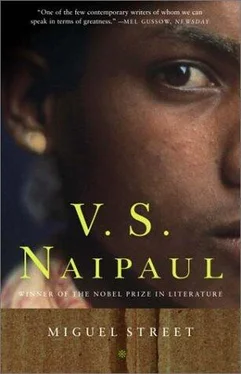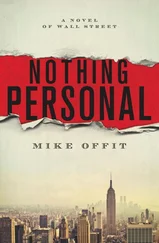Hat said, ‘It have two things for you to do. Overhaul your head or haul your arse away before you get people in trouble.’
Bhakcu said, ‘You boys go have to give me a hand to push the car back home.’
As we were pushing it past the house of Morgan, the pyrotechnicist, Mrs Morgan shouted, ‘Ah, Mrs Bhakcu, I see you buy a new car today, man.’
Mrs Bhakcu didn’t reply.
Mrs Morgan said, ‘Ah, Mrs Bhakcu, you think your husband go give me a ride in his new car?’
Mrs Bhakcu said, ‘Yes, he go give you a ride, but first your husband must give me a ride on his donkey-cart when he buy it.’
Bhakcu said to Mrs Bhakcu, ‘Why you don’t shut your mouth up?’
Mrs Bhakcu said, ‘But how you want me to shut my mouth up? You is my husband, and I have to stand up for you.’
Bhakcu said very sternly, ‘You only stand up for me when I tell you, you hear.’
We left the car in front of Bhakcu’s house, and we left Mr and Mrs Bhakcu to their quarrel. It wasn’t a very interesting one. Mrs Bhakcu kept on claiming her right to stand up for her husband, and Mr Bhakcu kept on rejecting the claim. In the end Bhakcu had to beat his wife.
This wasn’t as easy as it sounds. If you want to get a proper picture of Mrs Bhakcu you must consider a pear as a scale-model. Mrs Bhakcu had so much flesh, in fact, that when she held her arms at her sides they looked like marks of parenthesis.
And as for her quarrelling voice …
Hat used to say, ‘It sound as though it coming from a gramophone record turning fast fast backwards.’
For a long time I think Bhakcu experimented with rods for beating his wife, and I wouldn’t swear that it wasn’t Hat who suggested a cricket bat. But whoever suggested it, a second-hand cricket bat was bought from one of the groundsmen at the Queen’s Park Oval, and oiled, and used on Mrs Bhakcu.
Hat said, ‘Is the only thing she really could feel, I think.’
The strangest thing about this was that Mrs Bhakcu her self kept the bat clean and well-oiled. Boyee tried many times to borrow the bat, but Mrs Bhakcu never lent it.
So on the evening of the day when the car fell on Bhakcu I went to see him at work.
‘What you did saying about the tappet knocking?’ he said.
‘I didn’t say nothing,’ I said. ‘I was asking you.’
‘Oh.’
Bhakcu worked late into the night, taking down the engine. He worked all the next day, Sunday, and all Sunday night. On Monday morning the mechanic came.
Mrs Bhakcu told my mother, ‘The company send the mechanic man. The trouble with these Trinidad mechanics is that they is just piss-in-tail little boys who don’t know the first thing about cars and things.’
I went round to Bhakcu’s house and saw the mechanic with his head inside the bonnet. Bhakcu was sitting on the running-board, rubbing grease over everything the mechanic handed him. He looked so happy dipping his fingers in the grease that I asked, ‘Let me rub some grease, Uncle Bhakcu.’
‘Go away, boy. You too small.’
I sat and watched him.
He said, ‘The tappet was knocking, but I fix it.’
I said, ‘Good.’
The mechanic was cursing.
I asked Bhakcu, ‘How the points?’
He said, ‘I have to check them up.’
I got up and walked around the car and sat on the running-board next to Bhakcu.
I looked at him and I said, ‘You know something?’
‘What?’
‘When I did hear the engine on Saturday, I didn’t think it was beating nice.’
Bhakcu said, ‘You getting to be a real smart man, you know. You learning fast.’
I said, ‘Is what you teach me.’
It was, as a matter of fact, pretty nearly the limit of my knowledge. The knocking tappet, the points, the beat of the engine and-yes, I had forgotten one thing.
‘You know, Uncle Bhakcu,’ I said.
‘What, boy?’
‘Uncle Bhakcu, I think is the carburettor.’
‘You really think so, boy? ’
‘I sure, Uncle Bhakcu.’
‘Well, I go tell you, boy. Is the first thing I ask the mechanic. He don’t think so.’
The mechanic lifted a dirty and angry face from the engine and said, ‘When you have all sort of ignorant people messing about with a engine the white people build with their own own hands, what the hell else you expect?’
Bhakcu winked at me.
He said, ‘I think is the carburettor.’
Of all the drills, I liked the carburettor drill the best. Sometimes Bhakcu raced the engine while I put my palm over the carburettor and off again. Bhakcu never told me why we did this and I never asked. Sometimes we had to siphon petrol from the tank, and I would pour this petrol into the carburettor while Bhakcu raced the engine. I often asked him to let me race the engine, but he wouldn’t agree.
One day the engine caught fire, but I jumped away in time. The fire didn’t last.
Bhakcu came out of the car and looked at the engine in a puzzled way. I thought he was annoyed with it, and I was prepared to see him dismantle it there and then.
That was the last time we did that drill with the carburettor.
At last the mechanic tested the engine and the brakes, and said, ‘Look, the car good good now, you hear. It cost me more work than if I was to build over a new car. Leave the damn thing alone.’
After the mechanic left, Bhakcu and I walked very thoughtfully two or three times around the car. Bhakcu was stroking his chin, not talking to me.
Suddenly he jumped into the driver’s seat and pressed the horn-button a few times.
He said, ‘What you think about the horn, boy?’
I said, ‘Blow it again, let me hear.’
He pressed the button again.
Hat pushed his head through a window and shouted, ‘Bhakcu, keep the damn car quiet, you hear, man. You making the place sound as though it have a wedding going on.’
We ignored Hat.
I said, ‘Uncle Bhakcu, I don’t think the horn blowing nice.’
He said, ‘You really don’t think so?’
I made a face and spat.
So we began to work on the horn.
When we were finished there was a bit of flex wound round the steering-column.
Bhakcu looked at me and said, ‘You see, you could just take this wire now and touch it on any part of the metal-work, and the horn blow.’
It looked unlikely, but it did work.
I said, ‘Uncle Bhak, how you know about all these things?’
He said, ‘You just keep on learning all the time.’
The men in the street didn’t like Bhakcu because they considered him a nuisance. But I liked him for the same reason that I liked Popo, the carpenter. For, thinking about it now, Bhakcu was also an artist. He interfered with motor-cars for the joy of the thing, and he never seemed worried about money.
But his wife was worried. She, like my mother, thought that she was born to be a clever handler of money, born to make money sprout from nothing at all.
She talked over the matter with my mother one day.
My mother said, ‘Taxi making a lot of money these days, taking Americans and their girl friends all over the place.’
So Mrs Bhakcu made her husband buy a lorry.
This lorry was really the pride of Miguel Street. It was a big new Bedford and we all turned out to welcome it when Bhakcu brought it home for the first time.
Even Hat was impressed. ‘If is one thing the English people could build,’ he said, ‘is a lorry. This is not like your Ford and your Dodge, you know.’
Bhakcu began working on it that very afternoon, and Mrs Bhakcu went around telling people, ‘Why not come and see how he working on the Bedford?’
From time to time Bhakcu would crawl out from under the lorry and polish the wings and the bonnet. Then he would crawl under the lorry again. But he didn’t look happy.
Читать дальше












